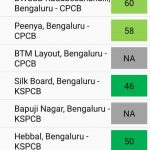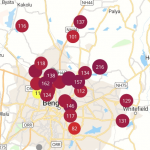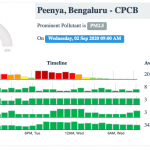By Anuksha Dey
Bengaluru’s Air Quality has been exceptionally poor since Thursday. The air quality index (AQI) lay between 100 and 163 on Thursday, Friday and Saturday. According to a study published by The National Center for Biotechnology Information in the US, it is best to avoid outdoor activities as well as any strenuous activity which increase the rate at which you inhale the polluted air and to stay away from high traffic areas when AQI is above 100. The experts also recommend using air purifiers where possible, and wearing masks outdoors is absolutely essential.
The Air Quality Index monitoring system
The World Air Quality Index classifies the level of pollutants present in the air into five categories: Good, Moderate, Unhealthy for Sensitive Groups, Unhealthy, Very unhealthy and Hazardous.
AQI in Bengaluru, the good the bad and the ugly
The Air Quality index for Bengaluru as a whole has varied between Unhealthy for Sensitive Groups and Unhealthy. However, the AQI varied for different localities. For those who live near Majestic and Saneguravahalli, the AQI Level remained relatively low as air pollution levels for the rest of Bengaluru soared.
Saneguravahalli had the lowest AQI level in all of Bengaluru, with air pollution levels remaining below 50 at all times.
Majestic too had an acceptable degree of air pollution. However, the pollution level did cross the 100 AQI mark between 4pm and 9 pm on Friday and 6pm and 7 pm on Saturday. But the pollution level remained below 114 for the most part.
The AQI for Kadubeesanahalli, Hebbal, Silk Board, Peenya and Koramangala remained consistently high. The AQI range lay between 101 and 200, making it extremely dangerous for those involved in outdoor activities. The air quality began to improve around the afternoon on Saturday but became worse at night again.
Air Pollution in Bengaluru
Bengaluru ranks 361st on the list of most polluted cities in the world. Pollutants emitted from cars and automobiles and illegal burning of waste along with construction dust contribute to the high air pollution level in Bengaluru, the fastest growing tech hub in the world. The pollution levels are generally higher in the dry months between October and May. The level of pollution decreased by 28% during the lockdown due to Covid 19 in 2020. However, the AQI has been on the rise again since November with the onset of winter.
Bengaluru’s high AQI is a more serious problem than most people realise. In fact, outdoor air pollution is the 5th biggest cause of mortality in the world. The people most exposed to diseases caused by air pollution are construction workers and drivers of two-wheelers. The Karnataka government aims to bring down the level of air pollution in the city by 20% as part of the National Clean Air Program launched in 2019. The city has already received a Rs 1.8 crore grant from the centre to purchase Mist Canons to tackle the air pollution problem. However, the effectiveness of the Mist Canons remains to be seen.



